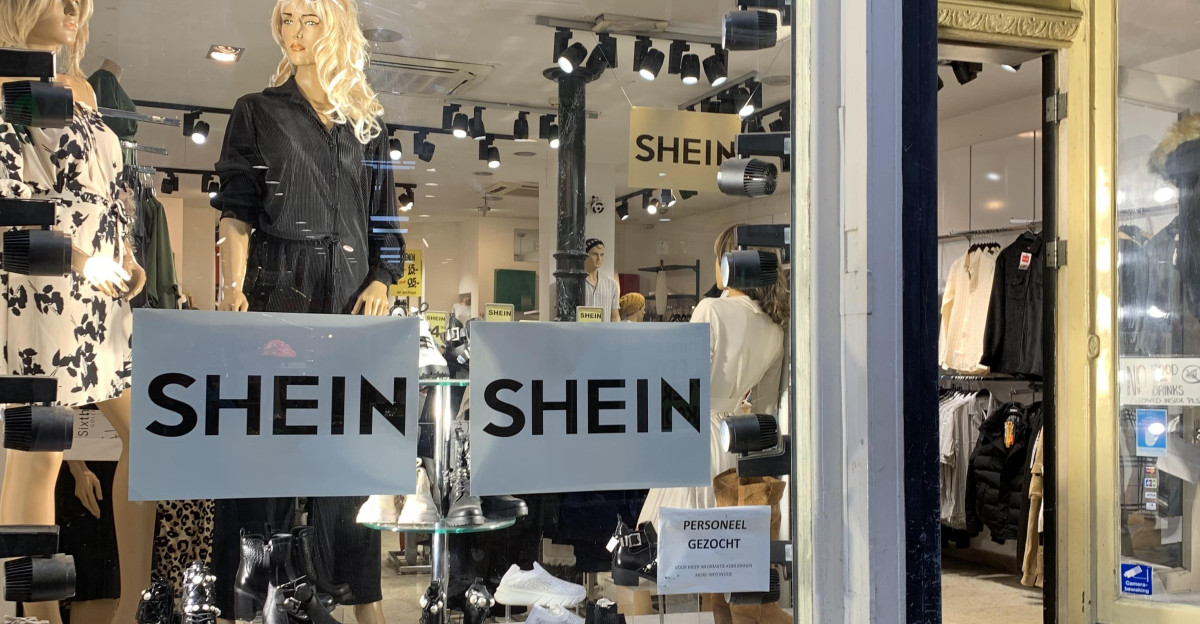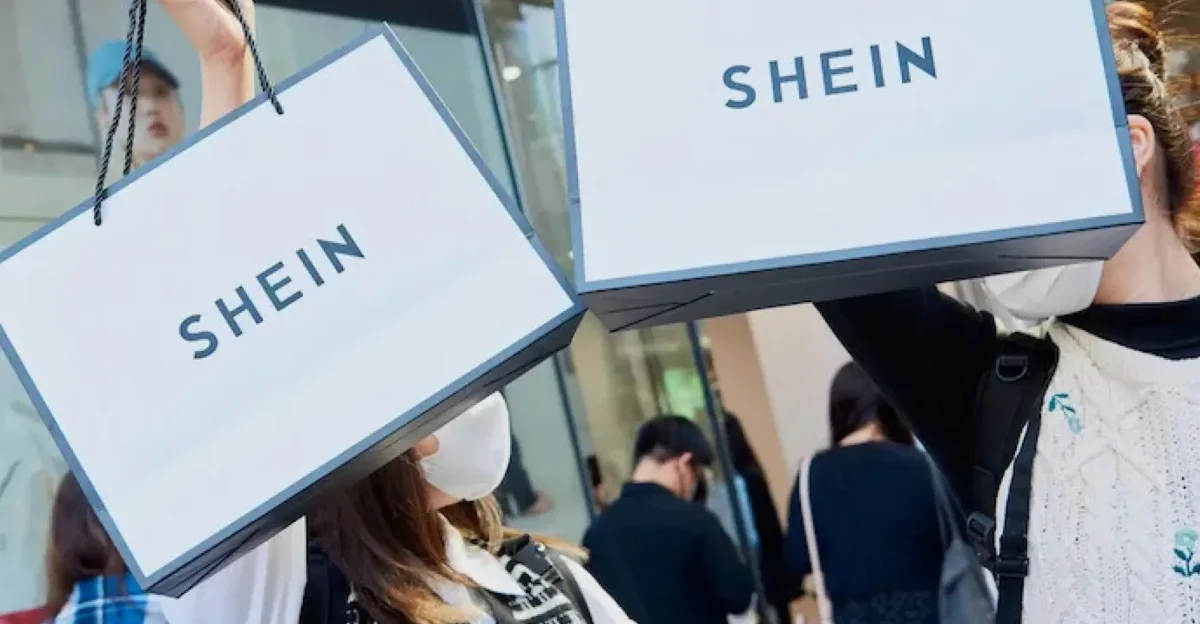
The fast-fashion behemoth Shein, which was founded in China, was fined a record €40 million by France in July 2025 for engaging in dishonest business practices that included false discounts and unsupported environmental claims. Following an 11-month investigation that examined thousands of Shein product listings on its French website, the Directorate for Competition, Consumer Affairs and Fraud Prevention (DGCCRF) in France imposed the fine.
Shein engaged in greenwashing by making unsubstantiated claims of a 25% reduction in greenhouse gas emissions. This case establishes a precedent for openness and the protection of consumer rights while highlighting the growing regulatory intolerance for deceptive marketing in the fast fashion industry. A new era of accountability for online retailers is being heralded by the DGCCRF’s largest-ever fine for such violations.
The Development of Fast Fashion and Regulatory

Opposition The emergence of fast fashion over the last 20 years has transformed the retail apparel industry by providing stylish, affordable clothing with a high turnover rate. Digital-native businesses like Shein, which use data analytics and social media to predict and quickly satisfy customer demand, have adopted and accelerated this business model, which was first introduced by brands like Zara and H&M.
Regulatory agencies have traditionally prioritized labor rights and environmental effects, but in recent years, they have shifted their focus to protecting consumers from deceptive business practices, which reflects a comprehensive approach to ethical retail. A wider social call for corporate responsibility in the digital age is reflected in France’s DGCCRF fine against Shein, which marks a turning point in the enforcement of laws addressing not only moral dilemmas but also the veracity of pricing and sustainability claims.
Pricing Through Psychological Manipulation

Shein takes advantage of well-established biases in consumer psychology by using phony discounts. Crossed-out prices and “limited-time” sales give the impression that something is scarce and urgent, which encourages impulsive purchases and a sense of value. Shein deceives customers into thinking they are getting a deal by inflating prices before applying discounts, creating artificial savings that don’t exist. This strategy erodes confidence and warps the fairness of the market.
According to psychological research, customers are particularly vulnerable to anchoring effects, in which their initial price, even if it is inflated, anchored their perception of value. Long-term brand loyalty can be damaged by this kind of manipulation, which can result in overspending and buyer’s regret. Moreover, pricing cues have even greater sway in the digital world since customers are unable to inspect products physically.
Fast Fashion Greenwashing: The Environmental Claims Pitfall

French regulators found Shein’s environmental claims, including a supposedly 25% reduction in greenhouse gas emissions, to be unsubstantiated. Making false or ambiguous claims about sustainability, or “greenwashing,” has become a common problem in the fast fashion industry as businesses try to meet the growing demand from consumers for eco-friendly products without actually making significant environmental improvements. This case highlights the dangers of flimsy “green” marketing that deceives customers and stalls real industry change.
The fast fashion industry has a big environmental impact; the production of textiles uses a lot of water and contributes about 10% of global carbon emissions. Customers are expecting more and more transparency regarding lifecycle impacts, manufacturing, and sourcing. But a lot of brands use vague terms like “sustainable” or “eco-friendly” without any agreed-upon definitions or independent confirmation.
Regulation and Implementation: France’s Model for Consumer Protection

The DGCCRF in France is governed by strict consumer protection laws that forbid misleading business practices and demand truthful advertising. In order to prevent artificial inflation of discounts, the regulation requires that promotional prices represent the lowest price during the 30 days prior to a sale. In order to conduct a thorough, data-driven enforcement investigation into Shein, the DGCCRF tracked prices in-depth for 11 months.
This model uses consumer complaints and advanced analytics to find misconduct trends. The Shein case serves as an example of how regulators can modify conventional consumer protection laws to accommodate the intricacies of digital marketing and e-commerce. The enforcement makes it clear to international companies doing business in Europe that compliance is a must, which may have an impact on corporate policies and practices around the world.
Shein’s Market Position, Compliance, and Reputation: Strategic Implications

Shein, which has based its brand on affordability and trendiness, has suffered a severe blow to its reputation as a result of this fine. The company is now being questioned more and more about its business practices. The company has acknowledged regulatory pressure and the need to realign practices with legal standards, as evidenced by its reported corrective actions and acceptance of the fine.
Beyond the short-term financial consequences, the fine jeopardizes Shein’s long-term brand equity, particularly with younger customers who place a higher value on ethical consumption. To stay competitive, the business must make investments in accurate marketing, verifiable sustainability initiatives, and transparent supply chain disclosures. Failing to do so might hasten the transition to more ethical brands.
Impact on a Wider Industry: A Spark for Transformation in Fast Fashion

The entire fast fashion industry, which frequently depends on aggressive discounting and dubious sustainability claims, might take note of Shein’s sanction. This case may hasten regulatory changes in Europe and elsewhere, promoting more stringent regulation of environmental marketing and promotional pricing. It also emphasizes the significance of digital transparency and the growing influence of consumer watchdogs.
Companies that disregard these trends run the risk of fines as well as a decline in investor confidence and customer loyalty, particularly as ethical and sustainable business practices become more important considerations when making purchases. The decision might encourage comparable inquiries into other significant participants, creating a level playing field and discouraging dishonest business practices across the board.
Is It Possible That Shein’s Practices Mirror Market Reality?

Although dishonest, Shein’s pricing tactics could also be seen as a sign of fierce competition in the market and the desire of customers for low costs. Some contend that stringent discount laws may hinder innovative promotions and restrict consumers’ access to reasonably priced clothing. Furthermore, the ability of fast fashion to provide flawless sustainability data is hampered by the intricacy of supply chains and environmental impact measurement.
Heavy regulation opponents caution that overzealous enforcement may limit options for consumers on a tight budget, raise prices, and decrease market dynamism. Furthermore, the lack of standardized metrics and fragmented supply chains makes it notoriously difficult to measure environmental impact accurately. According to this perspective, regulators, brands, and consumers should work together to create workable, scalable solutions that improve transparency while maintaining market vitality and inclusivity.
Transparency in Digital and Empowerment of Consumers

The Shein case represents a new paradigm in which digital transparency tools, like blockchain for supply chain verification and artificial intelligence (AI) for price monitoring, could empower both consumers and regulators. Improved data analytics make it possible to examine pricing and marketing claims in real time, which lowers the possibility of dishonesty.
By giving consumers and regulators direct access to verifiable information, these tools can promote trust. Consumer voices are being amplified by social media activism and influencer accountability, which puts pressure on brands to behave responsibly. A more open and sustainable fashion industry, where businesses are held accountable in real time and customers make informed decisions, is what the combination of ethics and technology promises.
Fast Fashion’s Accountability Telos

The €40 million fine imposed on Shein is not only punitive; it also represents a larger social demand for responsibility, openness, and moral business practices. It calls for a shift away from fast fashion’s reliance on deceptive advertising and flimsy green claims and toward sustainability and actual value. This case demonstrates the value of thorough investigation and data-driven enforcement, and it serves as a model for regulators around the world.
The decision also highlights how, in the digital age, where information is shared quickly and corporate responsibility is expected to rise, the relationship between consumers, businesses, and regulators is changing. The Shein case marks a sea change toward a future in which morality is essential to corporate success as fast fashion struggles with its history of excess and exploitation.